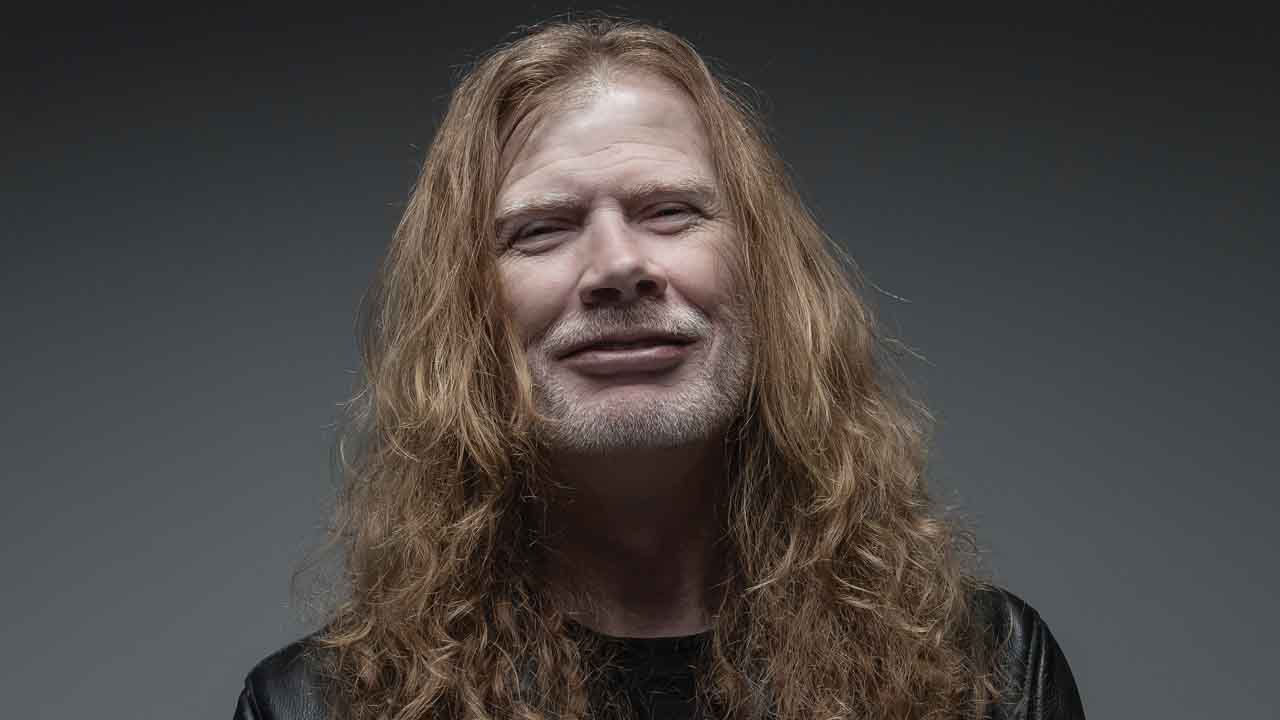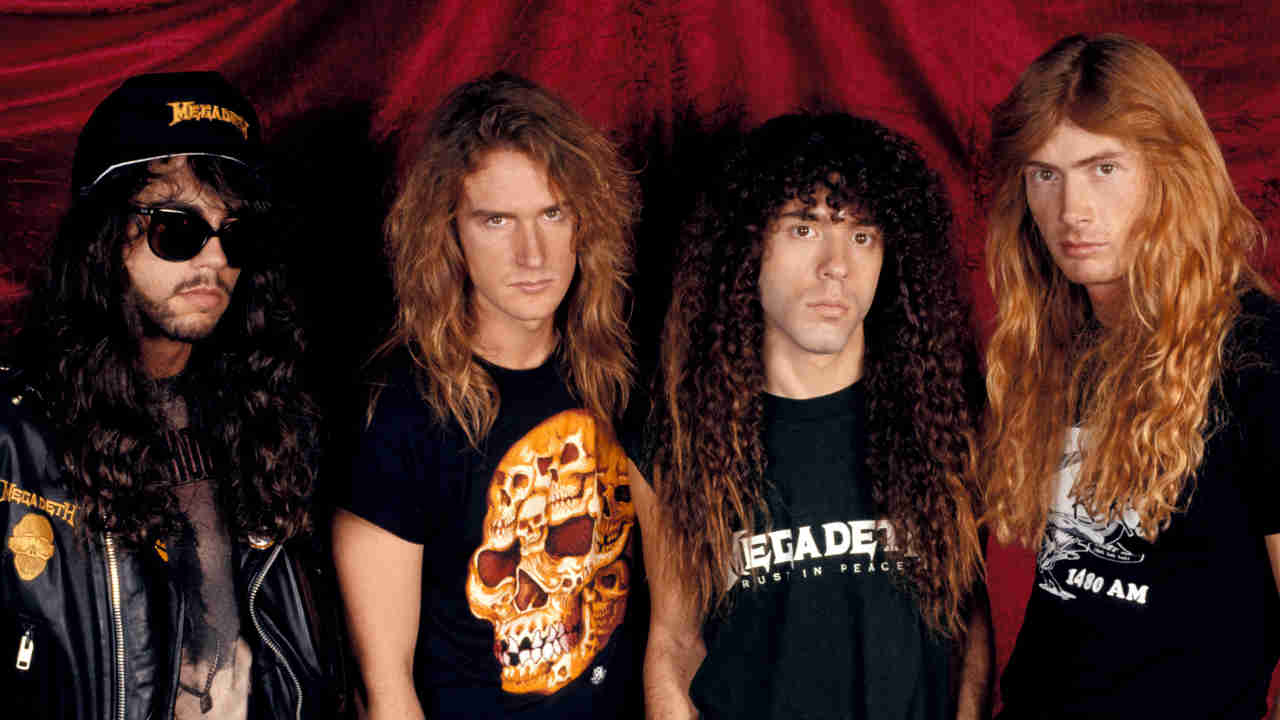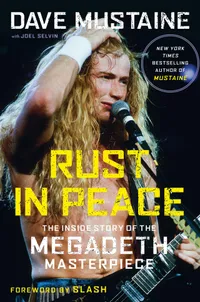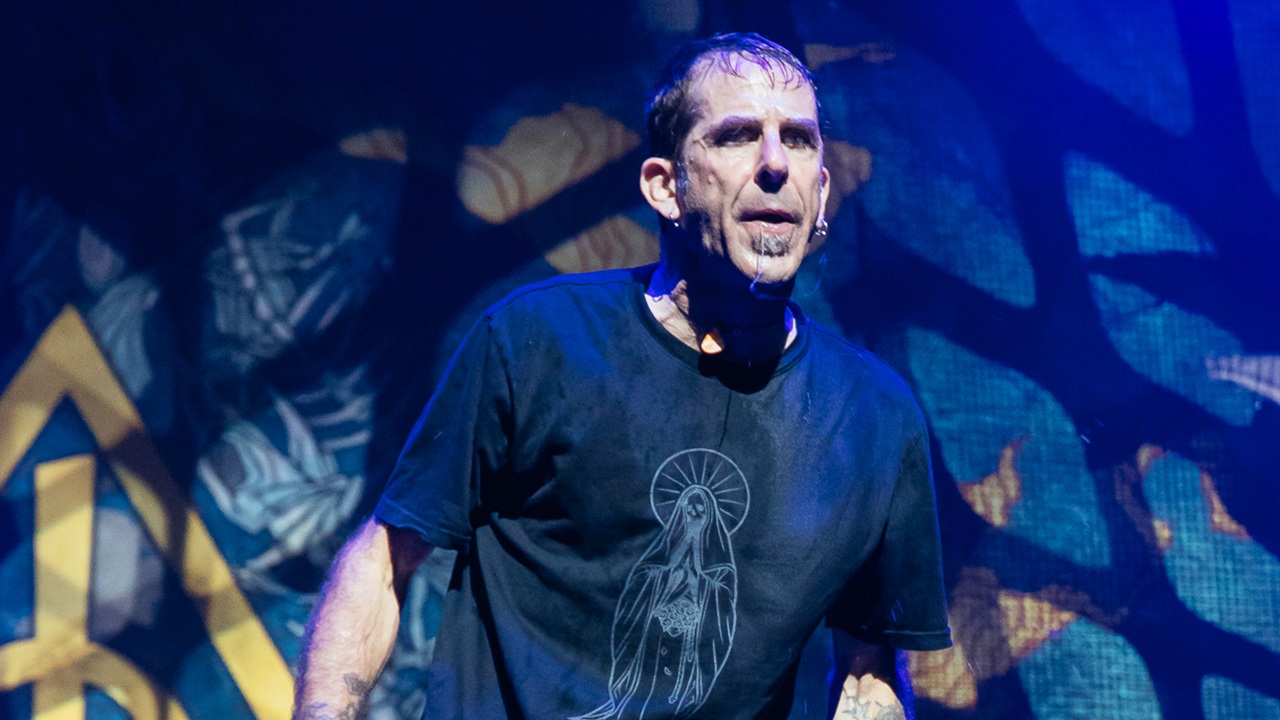Dave Mustaine: “Drugs? Why would I want to glorify something like that?”
Dave Mustaine looks back on Megadeth‘s Rust In Peace album – “a masterpiece created in the darkness of heroin”

Select the newsletters you’d like to receive. Then, add your email to sign up.
You are now subscribed
Your newsletter sign-up was successful
Want to add more newsletters?
The word “heroin” appears 62 times over the course of Rust In Peace: The Inside Story of the Megadeth Masterpiece, the newly released memoir about the making of the thrash stalwarts' landmark 1990 album. While the book's authorship is credited to founder Dave Mustaine, its format mirrors the multi-voice, oral history structure of another famous rock biography by a band who battled addiction – and each other – on their way to the top of the charts.
But while The Dirt glamorized the debauchery and hedonistic spoils of sex, drugs and rock n' roll, Rust In Peace… paints a far more callous – and, in turn, honest – portrait of substance abuse. Readers learn that bassist David Ellefson getting “dope sick” was the true reason Megadeth canceled its 1988 stadium tour with Iron Maiden; that the only lessons learned from multiple trips to rehab were creative ways to smuggle smack inside; and that Mustaine wasn't even present for “almost half” of the recording sessions for Rust In Peace after checking into a detox facility. It sounds like a recipe for disaster, but 30 years later, the album is rightfully revered as one of the genre's all-time classics.
Mustaine calls Hammer from his home in Nashville to talk about the book and the legacy of the album. As he starts to talk, he coughs. “Sorry,” he says. “Little after-effects from the radiation and chemo.”
Is he still undergoing treatment for https://www.loudersound.com/features/how-dave-mustaine-took-on-cancer-and-won?
“No, no, no – it's just everything's healing so rapidly,” he replies. “The doctor said that some people heal quick; some people heal slower. He told me that my healing has been absolutely amazing. He goes, 'The only thing is you're healing so fast, people will start making fun of you.'”
- The best metal guitars 2020: Get ready to shred with our essential list
- Less noise, more rock with the best budget noise cancelling headphones
- Best music streaming services: how do Spotify, TIDAL, Apple Music and others compare?
- Loudest Bluetooth speakers: the best speakers for maximum noise
Between beating cancer and conquering the demons that you detail in the new book, it's clear that you're a survivor. What made you decide to tell the album's story in an oral history format?
In The Bible, they talk about the gospel and the four perspectives of the same story. There's a lot of other really cool books in history that have the same thing, where several people watch the same car crash and they all tell the police what happened, and it's up to him to make up his mind who's telling the truth. That was one of the things with [our] book I thought was great. I also knew that it was going to be cathartic that the band guys and any of the crew members who may have gotten caught under the steamroller would have a chance to tell their side of the story. If it was true, then I would learn something from it because it was different from my understanding. If it was not true and they were making stuff up, hey, it's OK. If you say that's how it happened, who am I to argue?
Sign up below to get the latest from Metal Hammer, plus exclusive special offers, direct to your inbox!
The book begins with a foreword by Slash, who at one point was invited to join Megadeth. It's hard to imagine your technical precision meshing with his loose fluidity.
I think you have that backwards, and that Slash is actually a little more technical than I am. What we were playing, it was a very punkish/metal kind of vibe. For me, I love the way I can pick up the guitar and say 'Fuck you' to anybody with it. It's an art. A lot of people can't do that (laughs). A lot of people don't even know what that means. You have to completely command your guitar. There's great, powerful, beautiful players like Eric Johnson, and they kind of just adoringly caress their guitar. Me? I like to punch it in the stomach.

At one point in the book, David Ellefson describes Rust In Peace as “a masterpiece created in the darkness of heroin.” How crucial to making the album was getting high? Did you need to do one to do the other?
That's a really good question. I think it's putting a little too much merit on the euphoria from the drugs, because they had worn off long after we'd started (the album). It's like the old saying – first the man takes a drink, then the drink takes a drink, then the drink takes the man. The sad thing was, I was so out in the open with my debauchery and the fact that if you didn't like it, I would fight you. That didn't end up very good for me in Metallica, but that's how I was. It was just a way of life. We were street urchins, and nobody told me what to do – not now, not ever. As I started to get healthier, I started to realize that I could play guitar (sober), and there's a lot more to life than smuggling stuff and trying to always have something on you.
To your credit, the book paints the throes of addiction bluntly, and not with a colored lens.
If you're talking about drugs, you're going to need a specimen who's had experience with said substance and the cerebral aftermath, if you will. That's who you're talking to. Drugs make the guy cheat on his wife, make the wife cheat on her husband, make young kids suck dicks in an alleyway to get their fix. It's just crazy. Why would I want to glorify something like that?
You open the book with a bang, as the band is “strung out” at the 1988 Monsters Of Rock festival at Castle Donington – the biggest show of your career to that point.
We wanted to start off with the Castle Donington plane crash. We needed to have the reader jump in right into it – here we are, 110,000 people, the biggest PA ever. It's in the Guinness Book of World Records. Look at all these guys – Kiss, David Lee Roth, Guns N' Roses, Iron Maiden. And then, that happens. That enormous event was the first time that David had come out and shared some really scandalous information about what he had been doing. Right after that, we went home and lost six stadiums' worth of shows. It was tragic.
At one point, Ellefson writes that “if a lot of drug use didn't fuck up our friendship, a little bit of sobriety did.” You later admit that reading those words hurt you.
I care an awful lot about David, but we've had strong disagreements over the years. For me to give a homogenized version of whatever David said, that's not real. Some of the stuff that he discloses in the book is going to rock some people's worlds.
One of those disagreements was the unsuccessful lawsuit he filed against you while he was out of the band.
I was flying home from Dallas one time, and I had a layover in Phoenix (where Ellefson lives), and I called him and said, 'Hey, do you want to go get some food?' As soon as I saw him, he said, 'I want to apologize – suing you was the dumbest thing I've ever done in my life.' I looked at him, and I saw this guy who I had met so many years ago when he was young and curious and eager, and I just said, 'You know what? I forgive you.' I love the guy. He made a really terrible mistake – we all do – so we put that behind us, and now we're in the process of making one of the baddest records we've ever made.
Thanks for the segue! A few months ago, you mentioned that your new album would include 18 songs. Is that still the plan?
No. At the very beginning, I had 200 songs in my folder, but I've just been whittling it down and down and down. We're going to finish what we feel confident about. When you put out a record and you've got more songs than you need to, that's a waste, and if you put out songs that aren't finished because you don't have good enough songs, that's cheating the fans. Songs that are ready will be released; songs that are not will be worked on (later) or thrown out.
Considering the state of the world, you'll surely have no shortage of inspiration for lyrics.
I don't think I'm going to write about the virus, because it's so obvious. There's going to be a lot of stuff that comes out very shortly, and I guarantee you it will all be about this. I've already seen songs with 'Quarantine' in the title. For me, that's a timely event. I've always tried to make our lyrics be timeless.
A story recently made the rounds about you connecting with fellow throat cancer survivor Bruce Dickinson. When you revealed your diagnosis, did you receive any other unexpected shows of support?
Paul Stanley reached out to me, which was really cool. There were a lot of people who were sending their best wishes and love and good vibes and prayers and stuff, but the majority of them were all friends of mine, so I wasn't really too surprised that they had reached out – I was just happy that they did.
Last question – we know what Rust In Peace means to your fans, but what does it mean to you?
That's kind of a shitty question to answer with any real honesty, because it's 100 percent like asking a parent to pick their favorite kid. Even the fat kids, we parents love.
“Rust In Peace: The Inside Story of the Megadeth Masterpiece” will be released in the UK on Oct. 1 via Hachette Books.
Rust In Peace: The Inside Story Of The Megadeth Masterpiece
Dave Mustaine will examine the recording and release on Megadeth's landmark 1990 album Rust In Peace in this new book - set to be published in October.
Clay Marshall is a merch guy and writer. He has written for Metal Hammer, Blabbermouth, Classic Rock, Noisey, Billboard, Guitar World, LA Weekly, Prog and more.


